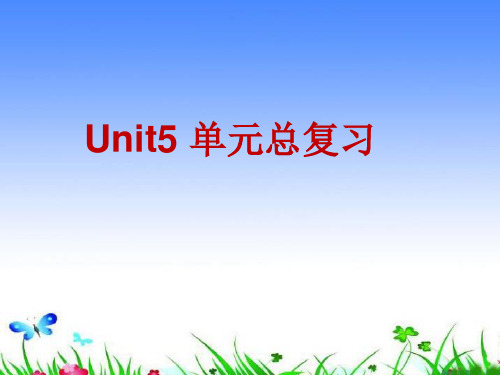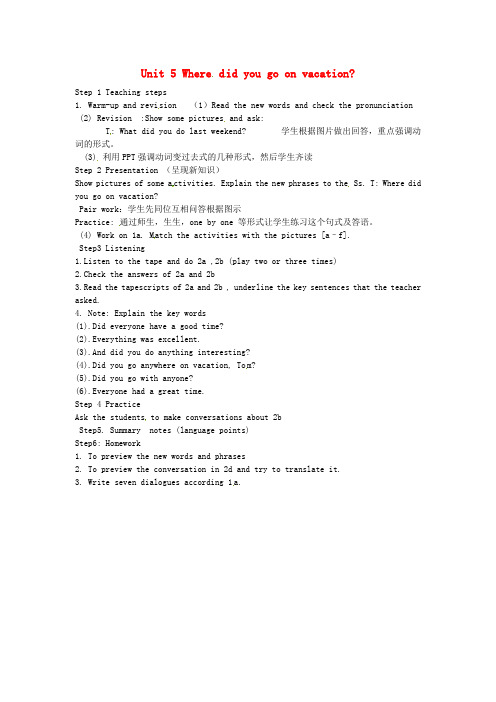鲁教版英语七年级上Unit5 Where did you go on vacation(2)
- 格式:doc
- 大小:33.50 KB
- 文档页数:4


Unit 5 Where did you go on vacation?Step 1 Teaching steps1. Warm-up and revision (1)Read the new words and check the pronunciation(2) Revision :Show some pictures and ask:T: What did you do last weekend? 学生根据图片做出回答,重点强调动词的形式。
(3)利用PPT强调动词变过去式的几种形式,然后学生齐读Step 2 Presentation (呈现新知识)Show pictures of some a ctivities. Explain the new phrases to the Ss. T: Where did you go on vacation?Pair work:学生先同位互相问答根据图示Practice: 通过师生,生生,one by one 等形式让学生练习这个句式及答语。
(4) Work on 1a. Match the activities with the pictures [a–f].Step3 Listening1.Listen to the tape and do 2a ,2b (play two or three times)2.Check the answers of 2a and 2b3.Read the tapescripts of 2a and 2b , underline the key sentences that the teacher asked.4. Note: Explain the key words(1).Did everyone have a good time?(2).Everything was excellent.(3).And did you do anything interesting?(4).Did you go anywhere on vacation, To m?(5).Did you go with anyone?(6).Everyone had a great time.Step 4 PracticeAsk the students to make conversations about 2bStep5. Summary notes (language points)Step6: Homework1. To preview the new words and phrases2. To preview the conversation in 2d and try to translate it.3. Write seven dialogues according 1a.。

鲁教版七年级英语上册Unit5Wheredidyougoonvacation单元备课教案《Unit 5 Where did you go on vacation》教材分析本单元的核心话题是用一般过去时谈论度假等发生在过去的事情。
因此“Where did you go on v acation?” “ Did you go to the beach”? Yes,I did.No,I didn’t.”等是教学的重点。
通过对本单元的学习,学生能掌握本单元出现的地点名词,用于询问和回答过去发生的事情的短语和句型。
教学目标1、知识目标:(1). The students can use the words and expression in talking about pastevents, such as Where did you go on vacation? Did you go to CentralPark?以及 How was the weather 等句型和答语.(2). The students can use Past tense of regular and irregular verbs totalk about past events.2、技能目标:(1).Train the stud ents’ four skills---- speaking, listening,reading, and writing.(2). Get the students to use the important words and expressions freelyto talk about past events..3、情感态度价值观目标:Enlighten students to get on well with each other by talking about past events.教学重点1. New words and phrases: anyone, few, quite a few ,most, went, stayed something,nothing, everything , ofcourse ,myself , yourself, hen , pig , seem , bored , something ,diary,delicious,exciting,terrible,expensive,cheap,boring, building,trader,umbrella,wet,because of,dislike,enough,decide,activity,try,wonder2. Key sentences:Where did you go on vacation? I wen t to ….Did you go to …? Yes, I did./ No, I didn’t.How was the food? It was great.教学难点How to talk about past events. 教学方法单元组合作学习情景教学学生情况分析学生在第三、四单元已接触过一般过去时,具有了学习本单元知识的认知前提,能自然地与本单元话题进行衔接。

Unit 5 Where did you go on vacation?Section A一、教学目标:1. 语言知识目标:1) 能掌握以下短语:went to New York City, visited museums, anything special, anyone interesting.能掌握以下句型:①---- Where did you go on vacation? ---- I went to New York City.②----Did you go with anyone?----No. No one was here. Everyone was on vacation.③---- Did you do anything interesting? --- Yes, I did.2) 能了解并掌握复合不定代词someone, anyone, something, anything等的用法。
3)一般过去时态的特殊疑问句,一般疑问句及其肯定、否定回答。
2. 能力目标:能够熟练运用所学知识进行信息交流,描述过去的事件。
3. 情感态度价值观目标:培养学生的环保意识,热爱大自然。
二、教学重难点1. 教学重点:1) 用所学的功能语言交流假期去了什么旅行。
2) 掌握本课时出现的新短语。
2. 教学难点:复合不定代词someone, anyone, something, anything等的用法。
三、教学过程Ⅰ. Lead-inHave a free talk.Look at some photos, then talk about your last summer vacation. How was it? Where did you go? (教师展示自己的照片,贴近生活,更能激发学生的兴趣,)Ⅱ. Presentation1. Show some pictures on the big screen. Let Ss read the expressions.2. Focus attention on the picture. Ask: What can you see? Say: Each picture showssomething a person did in the past. Name each activity and ask students to repeat: Stayed at home, Went to mountains, went to New York City ,went to the beach, visited my uncle, visited museums, went to summer camp3. Groupwork. Let the Ss make conversations just like this:A: Where did you go on vacation?B: I went to the mountains.A: Where did he /she go on vacation?C: He/She went to the mountains.4. Ask some groups to show their conversations.III. ListeningAsk: Do you want to our friends where they went? Listen to the tape, and finish the listening part on the learning paper. (将听力进行改编,更能突出本课时的教学重难点)①Listen and choose the right answers.⑴ Where did Xiang Hua go on vacation?A. The beachB. New York CityC. The mountains⑵ Did Bob do anything interesting?A. Yes, he was.B. No, he didn’t.C. Yes, he did.⑶ Who did Tom go with?A. His classmatesB. His friendsC. His parents②.Finish 2a and 2b.IV. Pair work1. Let two Ss read the conversation between Grace, Kevin and Julie.A: Where did Grace go on vacation?B: She went to New York City.A: Oh, really? Did she go with anyone?B: Yes, she went with her mother.2. Let Ss work in pairs and try to role-play the conversation, and then choose Kevin or Julie to write down.(写是语言技能的一部分,因此,写的训练,更能让学生发现自身的缺陷,进而更好的掌握语言知识)3. Ask some pairs to act out their conversations.V. Groupwork (Show yourself)Talk about your last vacation by using your photos and pictures in your group.Then show yourself to us.(通过学生自主交流,不仅锻炼学生口语能力,更能提高学生综合运用语言的水平。


U5Section A1.Where did you go on vacation?Where did you……一般过去时的特殊疑问句,“疑问词+did+主语+动词原形+其他?”did助动词,没有人称和数的变化。
on vacation在度假,休假=on holiday2.Oh,did you go anywhere interesting?I can’t find my book antwhere. go somewhere clean去干净的地方3.I was on vacation last month.On vacation固定搭配,不可以用in/atLast/next引导的实际状语,前面不加介词4.We took quite a few photos there.Take(1)带去Please take the book to him.=Please take him the book. 两宾语均为代词,只可以take it to him.(2)搭乘He takes a bus to school every day.(3)花费It takes sb. sometime to do sth.(4)做……事情, 常和名词连用,表示与该名词意义相关的动作take a walk散步, take a rest休息一下, take a look看一看等。
重要词组:(1)take away 拿走Tom takes the knife away from the little boy.(2)take care (=be careful=look out) Take care!The car is coming!(3)take (good) care of (好好)照顾,照料I can take care of the baby all by myself.(4)take down 取下来Take down the picture and put up the map of the world.(5)take out 拿出Please take out a piece of paper and write down your names on it, OK?(6)take off脱下;飞机(等起飞) ① Sorry! You have to take off your shoes before getting into the computer room. ② The plane is going to take off soon.(7)5.I went to a friend’s farm in the countryside with my family.名词所有格用以表示名词之间的所有关系,主要有of和’s(')两种表示方式。
鲁教版英语七年级上册unit5单元知识点归纳总结Unit5 Where did you go on vacation?一、短语归纳:1.go on vacation去度假2.stay at home待在家里3.go to the mountains去爬山4.go to the beach去海滩4.visit museums 参观博物馆5.go to summer camp去参观夏令营6.quite a few相当多7.study for为……而学习8.go out出去9.most of the time大部分时间10.taste good尝起来很好吃11.have a good time玩得高兴12.of course当然13.feel like给……的感觉;感受到14.go shopping去购物15.in the past在过去16.walk around四处走走17.because of因为18.one bowl of… 一碗…… 19.the next day第二天20.drink tea喝茶21.find out找出;查明22.go on继续23.take photos照相24.something important重要的事25.up and down上上下下e up出来27.buy sth. for sb. / buy sb. sth.为某人买某物28.taste + adj. 尝起来……29.look+adj. 看起来……30.nothing…but+ 动词原形除了……之外什么都没有31.seem+(to be)+ adj. 看起来……32.arrive in+大地点/ arrive at+小地点到达某地33.decide to do sth. 决定去做某事34.try doing sth. 尝试做某事35. try to do sth.尽力去做某事36.forget doing sth.忘记做过某事37.forget to do sth.忘记做某事38.enjoy doing sth.喜欢做某事39.want to do sth.想去做某事40.start doing sth.开始做某事41.stop doing sth. 停止做某事42.dislike doing sth. 不喜欢做某事43.keep doing sth. 继续做某事44.Why not do. sth.?为什么不做……呢?45. so+ adj.+ that+ 从句如此……以至于……46. tell sb. (not) to do sth. 告诉某人(不要)做某事二、重点句子:1. Where did you go on vacation? 你去哪儿度假的?2. Long time no see. 好久不见。
七年级英语复习案unit 5(编号: )编制人 审核人:七年级英语组 编制时间 年 月 日____________________________________________________________________________________________ Kevin ’s vacation:______________________________________________________________________________ ___________________________________________________________________________________________ Julie ’s vacation:______________________________________________________________________________ ___________________________________________________________________________________________三.P34 2d (1)自读对话 (2)补全对话(no books )Rick: Hi, Helen. ___________________________(好久不见).Helen: Hi, Rick. Yes, I was on vacation last month.Rick: Oh, ________________________________(你去有趣的地方了吗)?Helen: Yes, I went to Guizhou with my family.Rick: Wow! Did you see Huangguoshu Waterfall?Helen: Yes, I did. It was wonderful. We__________________________ (拍了好多照片)there.What about you?_______________________________________(上个月你做什么特别的事了吗)? Rick: Not really. I just _______________________________(大部分时间待在家里) to read and relax.(3)改写对话 Helen was on vacation last month. She _________to Guizhou with her family and ________ Huangguoshu Waterfall. It was _____________. She took _____________________ photos there. Rick didn ’t do __________ special last month. He just ______________________ most of the time to read and relax.四.Grammar 语法知识1. some, any, no, every 与-one, -thing 可以组成八个不定代词,他们分别是:某人_______________ 任何人_______________ 没有人_______________ 每人_______________ 某事_______________ 任何事_______________ 没有东西_______________ 一切_______________2. 带some 的复合不定代词常用于____________ 中;带any 的复合不定代词常用于____________ 或____________ 中。
鲁教版英语七上Unit 5 Where did you go on vacation Section B 教学设计1一. 教材分析鲁教版英语七上Unit 5的主题是“Where did you go on vacation?”,Section B主要讲述了不同学生度假的经历,通过听力、口语、阅读和写作等多种形式,让学生在实际语境中运用一般过去时谈论过去的事情。
本节课的内容与学生的生活实际紧密相连,有利于激发他们的学习兴趣和参与度。
二. 学情分析学生在学习本节课之前,已经掌握了一般现在时和一般过去时的基本知识,具备了一定的听说读写能力。
但部分学生对一般过去时的运用还不够熟练,需要老师在教学中进行针对性的指导。
此外,学生对于描述自己和他人的假期经历充满兴趣,这将为课堂活动的开展提供良好的动力。
三. 教学目标1.知识目标:学生能够听懂、会说、会读、会写本节课的重点词汇和句型,如“Where did you go?”, “What did you do?”等;2.能力目标:学生能够在实际语境中运用一般过去时谈论自己的假期经历;3.情感目标:通过描述假期经历,学生能够增进与同学之间的了解和友谊。
四. 教学重难点1.重点:一般过去时的运用;2.难点:一般过去时态的动词形式变化。
五. 教学方法采用任务型教学法、情境教学法和交际法,通过设定各种真实的语境,引导学生积极参与课堂活动,提高他们的听说读写能力。
六. 教学准备1.教师准备:提前准备听力材料、图片、PPT等教学资源;2.学生准备:预习本节课的生词和句型,准备好谈论自己的假期经历。
七. 教学过程1.导入(5分钟)利用PPT展示不同国家的旅游景点,引导学生谈论自己最喜欢的旅游地。
通过提问“Where did you go?”,激发学生对旅游话题的兴趣。
2.呈现(10分钟)播放听力材料,让学生听懂并回答相关问题。
然后呈现本节课的重点词汇和句型,如“Where did you go?”, “What did you do?”等,引导学生跟读并模仿。
Unit5 《Where did you go on vacation》设计理念根据新课程标准提倡的任务型教学,为了培养学生的主动和创新能力,在教学中我们设计了多种形式的任务,面向全体学生,突出学生的主体地位,尊重学生的个体差异,采用活动途径,倡导体验与参与,在培养学生语言能力的同时,逐步培养学生的思维能力、想象能力和创新能力。
结合本单元的题材,提高学生的地域常识和逻辑表述能力。
学习目标1.学会谈论过去发生的事件——学习一般过去式的用法2.学会谈论节假日的活动3.学会以日记的形式记录一天的活动并表达感想教学重点、难点1.词汇:stayed,visited,went,did,were,was,mountains,summercamp,museum,expensive,inexpensive,crowed,delicious,notbad,prett y good,terrible,great,fun,beautiful,unfriendly,interesting 2.句型: Where did you go on vacation?We went to New York.Did you go to central Park?Yes,I did.How was the weather?It was humid.教学准备图片,单词卡片,设计、准备每一项任务所需要的语言项目。
教学时间4 课时教学过程:The First Period1、Make up a dialogue(work in pairs)2、Ask questions about what students did last Saturday?Ask:Who went to the movies last Saturday?’Answer:Tom went to the movies last Saturday.Underline the word went,say,We use the word to talk about thingsthat happened in the past.Talk about the past.3、1a Ask students to tell what they see. Say Each picture showsa person did in the each activity and ask students to repeat.Ask students to reat the name of the activity.Point out the sample answer.1b Listening1c Point out the example conversation.Work in pairs.Make your own conversations about the pictures.2a Listen Where did Nancy,Kevin,and Julie go on vacation?Match the person with place.2b listen again.For each question check”Yes,Idid.”or”No,Ididn’t”as you hear them talk.2c As students talk move around the room monitoring the conversations and offering support as needed.3、Practice任务活动(此活动为小组活动。
学生谈论自己去过的一些地方,然后绘一张简易的地图。
通过此项任务,学生学会询问别人去过的地方。
)Have you been to some interesting places on your vacation? Would you please share your happy experiences with your partners?Please tell your friends about the places you went.1)学生四人一组展开活动,互相询问同伴去过的一些地方。
2)每组成员合作完成一张地图,图上标出大家去过的地点。
根据组员的旅游经历,学生可以画市区图,也可以画全国地图甚至世界地图。
3)组与组之间交换地图,共同找出大家去得最多的地方。
Homework回忆一次有意思的旅行,写一小段旅行记录。
The Second Period一、任务示范1、根据学生写的旅行记录,学生互相修改旅游记录中的细节,包括理想的旅行路线、天气状况等。
2、让学生分组描述曾经去过的有代表性的地点,其他组的学生猜是什么地方,看哪组学生用最少的信息就能猜对。
完成任务所需要的语言结构:How was your vacation?It was pretty good.3、每组选一个代表,描述每个组员去过的地方。
二、Pairwork1、教师出示多幅下载图片,学生选择并编写对话。
如:Where did he go?He went to New York City.What did he think of his vacations?It’s pretty good.2、谈论3a图画内容,把图画与对话匹配,并分组表演。
三、4 Explain to the students that they are going to make a vacation photo album and talk about it with their classmates.Using the simple past tense,point to each picture and describe a few things about your time in each place.When students have interviewed several classmates,have them discuss in pairs where in China they think would be the best place for a vacation.It could be somewhere one of them has been to,or just somewhere they have heard of and would like to visit.Homework:1.听力练习 Section B 1a2.描述自己最快乐的一天。
The Third Period一、任务示范1、学生描述自己最快乐的一天。
通过此项任务,学生学会描述过去发生的事件。
Teacher: I was very happy last Sunday.I took my son to the zoo.We saw a lot of animals.Some were very funny,and some were very cute.We had a wonderful time that day.I’m sure you had lots of happy days.please tell your partners about the happiest day you had and what you did on that day.1) 学生四人一组展开活动,轮流讲述自己最快乐的一天,介绍自己那天做了哪些事情。
2) 学生进行信息交换,即,将原来的小组按A号组、B号组、C号组、D 号组重新组合,组成A号组、B号组、C号组、D号组。
新的小组成员交换在刚才的小组里得到的信息,并记录下新得到的信息。
最后回到原来的小组,将新得到的信息向组员汇报。
完成任务所需要的语言结构;1、A:What did you do last weekend?B:I visited my grandmother.2、A:Did you have a good time?B:Yes,I did.3、My friend had a good time last Sunday.He visited his grandmother.He was very happy.二3a Ask a different student to read each entry in the diary.Answer any questions students have about the new words.Explain theinstructions to the activity.Read the diary and circle all the good things about Kim’s holiday.Underline all the bad things.Ask students to finish the activity individually.4 GroupworkImagine you are all foreigners on vacation in china.You meet each other at the airport on your way home.Talk about what you did on your vacation.三 Homework1、Section B 2a and 2b2、Write a travel diaryThe Fourth Period一、Revise the words by card.Play a game.have a competition of reading words.二、学生交换日记,讨论哪些旅游是有趣的、快乐的,哪些是伤心的和无聊的。
所需语言结构1、I went to the Biology Museum on vacation.2、It was great.I saw many insects there.3、I think it was interesting and I want to visit there again.4、Bob went to the beach but I think his trip was sad because he didn’t swim.二、Complete a questionnaire and make a survey.1、Make questions for a vacation questionnaire.2、Answer the questionnaire yourself.3、Ask your classmates the questions.4、Discuss the best place for a vacation with your classmates.3、Write a report on students’vacations.QuestionnaireNAME: AGE: SEX: DATE: PlaceActivitiesFoodWeatherSouvenirsHomework收集一些人物活动的照片,选择4—5幅编一个小短文。